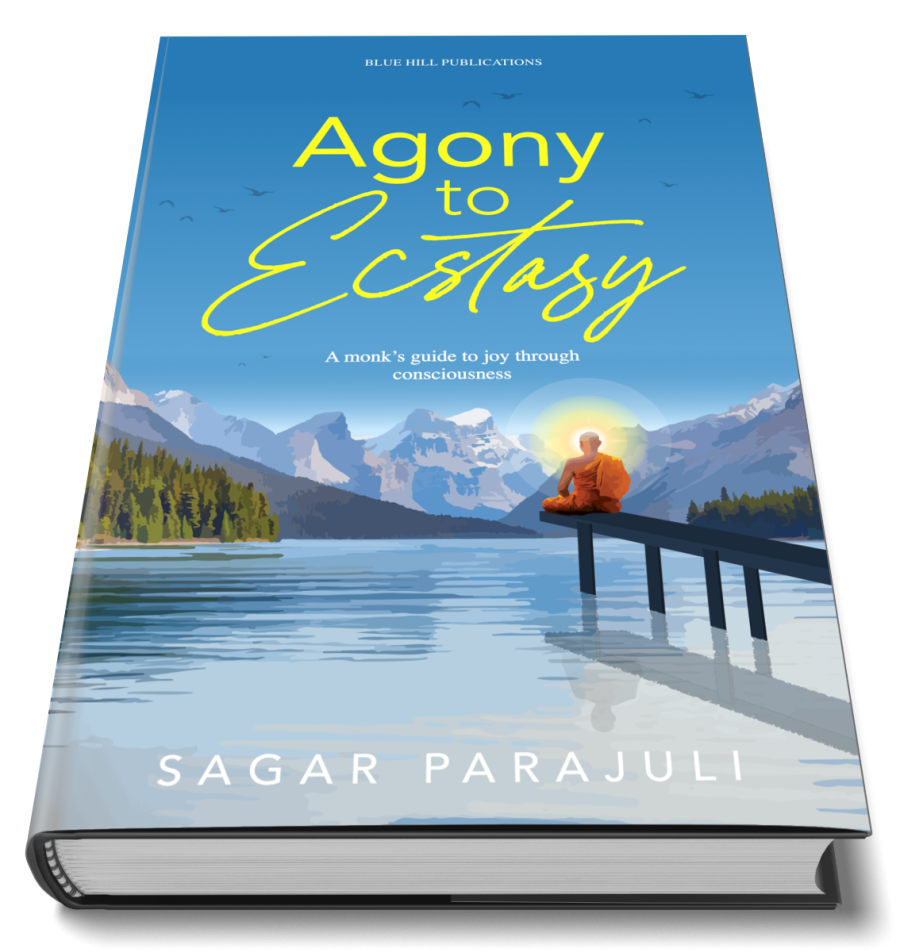Books
A new perspective on self-discovery
Sagar Parajuli’s ‘Agony to Ecstasy’ explores concepts like life, death, karma and meditation, seamlessly blending Eastern wisdom with scientific insights.
Shreedhar Acharya
‘Agony to Ecstasy’ is a recent self-help release by Nepali author Sagar Parajuli, a geoscientist based in the US. At first, I considered it just another self-help book in a crowded market. However, as I delved in, it felt different, as if penned by someone deeply enlightened.
Self-help books in English by Nepali authors are incredibly rare, both in Nepal and globally. While there are numerous self-help books available, most are authored by Western writers. Interestingly, many of these bestsellers draw inspiration from Eastern wisdom. Thus, there was a noticeable gap, one that ‘Agony to Ecstasy’ fills by presenting authentic Eastern knowledge in a language spoken worldwide.
The author led a fulfilling life with a stable job and a happy family. Despite this, a profound sense of unease lingered, a feeling that something essential was missing. This inner turmoil led him to explore the roots of his discontent, eventually guiding him towards the practice of Yoga. Thus, his spiritual journey commenced.
In the opening section of the book named ‘The Immortality of Life’, the author explains the intricate concepts of life and death using straightforward scientific explanations. He reassures readers that there’s no need to fear life, as our “awareness” never truly ceases to exist. The author encourages readers to embark on adventures to discover their true nature. For example, referring to the bungee jump, he says, “You will have an opportunity to glimpse the ‘afterlife’ when you fall facedown into that deep, formidable chasm.”
My interest deepened as the author shared his spiritual encounters, such as feeling a tingling sensation between the eyebrows, experiencing a surge of energy from the base of the spine and the release of happy hormones in the brain. In the chapter titled ‘Dynamics of Body, Mind, and Consciousness’, the author provides practical tips to master the mind, highlighting the connection between the moon and our mental state. He distinguishes between Shiva and Krishna, representing silence and awareness, respectively. Reflecting on the Mahabharata story, he observes that the triumphs and tragedies of this ancient tale echo within our lives and society daily.
In the next section, the author elucidates the subtle workings of life as the interplay of Shiva and Shakti, symbolising the masculine and feminine energies. Here, he dispels misconceptions about self-realisation, emphatically stating, “You could also be under the impression that only exceptional people like Buddha or Ramana Maharshi only could attain this state of absolute bliss. Well, I am here to tell you that this idea is false.”
In the book’s concluding section, the author outlines eight practical steps for self-discovery, each intricately aligned with human existence, making them highly sensible. The first lesson, ‘Perform Karma’, simplifies the complex concept of ‘karma’ using practical examples, highlighting that the results of our actions are influenced by various external factors. The author emphasises our full responsibility for the events in our lives, both positive and negative. Additionally, he discusses the transformative power of forgiveness, noting that it untangles emotional energy knots when practised with understanding.
In the second step, ‘Detox your body’, the author emphasises mindful eating, promoting organic and local food choices and fostering environmental consciousness. He explains that mealtime rituals are meant to purify the mind, not the food itself. Being fully present while eating enables us to eat slowly, pay attention to our food and consume the right amount, leading to better assimilation and improved health.
The third step, ‘Unburden’, advocates detachment from material possessions, reshaping thought patterns. The author stresses the significance of secret giving, underlining its positive impact on the mind. He also promotes gratitude and acceptance, stating, “When you are ready to accept whatever happens in your life, an inner transformation begins. You start to experience the higher dimensions of life.”
The fourth step, ‘Pay attention’, involves observing every detail in our surroundings to train the mind away from compulsive thoughts, conserving energy. The author recommends focusing on breathing, aligning with the wisdom shared by Eckhart Tolle in ‘The Power of Now’, to find life’s rhythm and enhance awareness. Midway, the author offers practical tips to energise homes, asking readers, “Have you been getting bad dreams lately? Are accidents happening more frequently in your home?” Simple remedies, from cleaning to burning incense, are suggested, enhancing the home’s vibrancy.
The author’s fifth step is ‘Meditate’, where he advises us to pause and listen to nature’s sounds, highlighting that true meditation lies in observing silence. To quieten the mind, he suggests diminishing the ego, allowing our ‘presence’ to intensify. The sixth step, ‘Do Yoga’, explores yoga’s deeper meaning and offers practical tips for its integration into daily life.
In the seventh step, ‘Find your Guru’, the author mentions inspiring Gurus but emphasises that our ‘self’ is the ultimate Guru, the true source of knowledge. Finally, in the last step, ‘Surrendering’, the author stresses the importance of the mind surrendering to the underlying ‘awareness’ to realise our higher power.
In the final chapter, the author emphasises the importance of remembering what you read for true understanding. I have endeavoured to follow this advice, and this book has positively influenced my awareness, especially during a period of my life when I was struggling to find my rhythm. The author’s shared experiences resonated with my own, gained through a decade of practising yoga and meditation.
What sets ‘Agony to Ecstasy’ apart from most self-help books is its authenticity and relatability to everyday life. It seamlessly combines ancient wisdom, scientific insights and practical, contemporary advice. Whether you’re caught up in work, stressed, or finding it hard to balance your professional and personal life, this book is a must-read. Even if you’re content and happy, this book can amplify your joy.
Agony to Ecstasy
Author: Sagar Parajuli
Year: 2023
Publisher: Blue Hill Publications




 9.89°C Kathmandu
9.89°C Kathmandu










